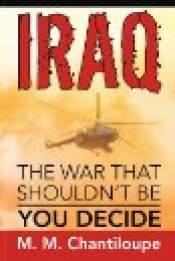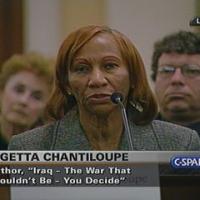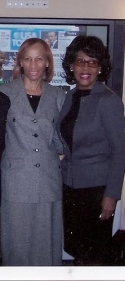
Iraq: The War That Shouldn’t Be – You Decide, by M.M. Chantiloupe (Xlibris Corporation, 2010, 305 pages).
Book Review by Dennis Moore
May 16, 2015 (San Diego’s East County) - Although the Iraq war is over, we are still feeling the residual effects of that controversial campaign, and it is put into perspective by San Diego resident M.M. Chantiloupe in her book; Iraq: The War That Shouldn’t Be – You Decide. Chantiloupe writes a scathing analysis and rebuke of the Bush Administration in this well-written and incisive book. She asks rhetorical questions that gets us all to think about why we actually went into that war and the harm that it has done to America and Iraq, as well as the world itself. Central in her discussion is the false pretenses of weapons of mass destruction. Chantiloupe writes in a scholarly fashion her analysis of this war and its residual effects, such as the current threat of ISIS, or the Islamic terrorist threat.
 Chantiloupe, a native of Jamaica West Indies, now living in San Diego, is a Certified Financial Planner with the Certified Financial Board of Standards, a retired General Stock Broker with the Financial Industry Regulatory Authority (FINRA), formerly National Association of Securities Dealers (NASD) and Registered Investment Advisor with the Securities and Exchange Commission, which gives her keen insight into some of the financial implications of that war in Iraq that she is not bashful about pointing out in Iraq: The War That Shouldn’t be. She connects the dots between those that would benefit from such a costly endeavor.
Chantiloupe, a native of Jamaica West Indies, now living in San Diego, is a Certified Financial Planner with the Certified Financial Board of Standards, a retired General Stock Broker with the Financial Industry Regulatory Authority (FINRA), formerly National Association of Securities Dealers (NASD) and Registered Investment Advisor with the Securities and Exchange Commission, which gives her keen insight into some of the financial implications of that war in Iraq that she is not bashful about pointing out in Iraq: The War That Shouldn’t be. She connects the dots between those that would benefit from such a costly endeavor.
Chantiloupe's entrepreneurial father was involved in politics and government. And, these attributes became a part of her life. She always wanted to know what was happening in the government as well as the private sector, not only in the U.S. but other countries as well. Her interest piqued more so during an election year and a new administration.
The author points out in her book that after watching the buildings collapsed in downtown Manhattan on September 11, 2001, and the ensuing catastrophe, she started to do some research on Osama bin Laden and Saddam Hussein. She discovered that bin Laden and Saddam Hussein disliked each other so it was unlikely that they would work together.
Chantiloupe further states in her book that in 1998 the Clinton administration launched Desert Fox and took out Iraq's chemical facilities and containment was effective because of the no-fly zone. And in August of 1982, Israel used U.S. Tomahawk missiles to take out Iraq's nuclear facilities and it was never restarted.
The author comes out swinging in this book, pulling no punches. In the very first chapter, Deception Contrived On Both Sides Of The Ocean, Chantiloupe lays out the premise for the war on Iraq, by stating: “It appears that the Bush Administration had long planned an invasion of Iraq prior to the September 11, 2001, attacks on the United States, but not because it believed that Saddam Hussein had chemical and biological weapons and was affiliated with Obama bin Laden.” She further indicates that Britain’s Tony Blair had complicity in this deception.
The author states in a very profound way: “But who suffers the most in the attack on Iraq? The U.S soldiers and the Iraqi people tend to be the biggest losers in this conflict, not only in terms of death and destruction, but also the inhumane conditions under which the soldiers have to perform their sometimes impossible tasks without the proper armor, while the Bush administration paid Halliburton billions of dollars on no-bid plus costs contracts.”
Some of what the author has written may be considered as revisionist history, but the residual effects of this ill-conceived war in Iraq may be everlasting. This is a well-researched and documented treatise on the Iraq war, with scholarly analysis demonstrated by Chantiloupe.
In an emphasis and indication of the brilliant analytical mind of the author regarding the war in Iraq, and the residual effects of it that we still feel, the author profoundly states: “The Bush administration shifted its rhetoric on November 21, 2003, by saying that Osama bin Laden has taken himself out of the leadership position of al-Qaeda; therefore it is no longer important to catch him. What happened to Bush’s earlier remarks that he wanted Osama bin Laden dead or alive?”
Ironically, Jeb Bush, a likely candidate for the Republican nomination for president in 2016, was pressured this past week into rejecting, in hindsight, his brother's war.
 Chantiloupe further states: “On the one hand, Bush and Cheney link Osama and Saddam in the same context of terrorism in just about every speech they make and that they have to be captured or killed to stop the spread of terrorism and to prevent another attack on the United States. On the other hand, before Saddam was captured, they said Saddam Hussein was no longer a threat and that Osama is no longer the leader of the al-Qaeda terrorist group. Now we do not know what to believe when U.S. government officials keep flip-flopping on statements regarding their intent to capture or kill Osama bin Laden.
Chantiloupe further states: “On the one hand, Bush and Cheney link Osama and Saddam in the same context of terrorism in just about every speech they make and that they have to be captured or killed to stop the spread of terrorism and to prevent another attack on the United States. On the other hand, before Saddam was captured, they said Saddam Hussein was no longer a threat and that Osama is no longer the leader of the al-Qaeda terrorist group. Now we do not know what to believe when U.S. government officials keep flip-flopping on statements regarding their intent to capture or kill Osama bin Laden.
 This book and its revelations caught the attention of Congresswoman Maxine Waters (D-Los Angeles), who invited Chantiloupe to speak before a committee of Congress on its implications. The author describes in her subsequent book; Driven: When Obstacles Take Center Stage, how Congresswoman Waters would escort her to the forum. In a letter to Chantiloupe prior to this forum, Congresswoman Waters states: “I have reviewed your book, Iraq: The War That Shouldn’t Be – You Decide. It is an impressive body of work that deserves the attention of the public and our nation’s policymakers. As the Founder of the ‘Out of Iraq’ Congressional Caucus, I am interested in having you attend a meeting of our Caucus to discuss your book.” I agree with Congresswoman Waters, this is definitely a book that deserves the attention of the public and our nation’s policymakers!
This book and its revelations caught the attention of Congresswoman Maxine Waters (D-Los Angeles), who invited Chantiloupe to speak before a committee of Congress on its implications. The author describes in her subsequent book; Driven: When Obstacles Take Center Stage, how Congresswoman Waters would escort her to the forum. In a letter to Chantiloupe prior to this forum, Congresswoman Waters states: “I have reviewed your book, Iraq: The War That Shouldn’t Be – You Decide. It is an impressive body of work that deserves the attention of the public and our nation’s policymakers. As the Founder of the ‘Out of Iraq’ Congressional Caucus, I am interested in having you attend a meeting of our Caucus to discuss your book.” I agree with Congresswoman Waters, this is definitely a book that deserves the attention of the public and our nation’s policymakers!
 Dennis Moore is the Associate Editor of the East County Magazine in San Diego and the book review editor of SDWriteway, an online newsletter for writers in San Diego that has partnered with the East County Magazine, and a freelance contributor to EURweb based out of Los Angeles. Mr. Moore can be contacted at contractsagency@gmail.com or you can follow him on Twitter at: @DennisMoore8.
Dennis Moore is the Associate Editor of the East County Magazine in San Diego and the book review editor of SDWriteway, an online newsletter for writers in San Diego that has partnered with the East County Magazine, and a freelance contributor to EURweb based out of Los Angeles. Mr. Moore can be contacted at contractsagency@gmail.com or you can follow him on Twitter at: @DennisMoore8.







Comments
What the UN weapons inspector told me
I met Scott Ritter, the UN weapons inspector. He told me that there were absolutely no weapons of mass destruction and his report stated that. But his superiors changed/falsified his report. When he objected he was told there would also be weapons of mass destruction shown in the reports to justify military action.
Ritter was a conservative Republican in the Reagan administration. He was so outraged by the falsifying of his report to justify war that he considered that treason by Bush and Cheney. I met him while covering a Democratic convention. He'd come to offer to speak and campaign for any Democratic Congressoinal or Senate candidate who would speak out against a war based on lies and support war crimes against for those responsible.
The mainstream media covered this up. The truth was there. But nobody wanted to believe we had leaders willing to slaughter Iraqis and our own troops for a war that now appears to have been all about oil -- remember that both Bush and Cheney were oil men from companies and families invested heavily in the oil industry.
The Downing Street memo further corrobrated other lies told to dupe people into supporting a war for no reason other than greed.
Re: Iraq War
Re: The Iraq War
Iraq War history ensnares Hillary, Jeb
In January 2007, shortly after entering the race for the 2008 Democratic presidential nomination, Hillary Clinton traveled to Iowa, where one of the first questions she faced was about her vote to authorize the war in Iraq, according to a Commentary in the Antelope Valley Press by Byron York, chief political correspondent for The Washington Examiner. Mr. York further stated in his Opinion piece in the Antelope Valley Press, based in Lancaster, California; "She uttered the most irritating and disingenuous nine words in politics: 'If we had known then what we know now,'" wrote New York Times columnist Maureen Dowd of Clinton during that 2007 Iowa visit. "(Democratic Sen.) Jim Webb knew. Barack Obama knew. Even I knew, for Pete's sake. The administration's trickery was clear in real time."
Iraq War
Iraq: The War That Shouldn’t Be – You Decide, by M.M. Chantiloup
Who's to blame?
IRAQ: THE WAR THAT SHOULDN'T BE - YOU DECIDE
Just today, on "Meet the Press", a serious debate about Iraq came up. Jeb Bush, who is running for President, seemed to go against the wisdom of his brother going to war against Iraq. Rand Paul also weighed in on the issue. He seemed to think that the emergence of ISIS came about as a result of the war in Iraq, and also seemed to imply that Saddam Hussein would have been more of a stabilizing influence in the area if we would have not invaded.
Of course
TOP CANDIDATES: IRAQ WAR A MISTAKE
A dozen years later, American politics has reached a rough consensus about the Iraq War: It was a mistake. This, according to an Associated Press story by Connie Cass in the Antelope Valley Press in Lancaster, California. Cass further states: "Politicians hoping to be president rarely run ahead of public opinion. So it's a revealing moment when the major contenders for president in both parties find it best to say that 4,491 Americans and countless Iraqis ost their lives in a war that shouldn't have been waged", which is the premise of Chantiloupe's book. Cass additionally states: "What might seem a hard truth for a nation to acknowledge has become the safest thing for an American politician to say - even Bush's brother. The fact that Jeb Bush, a likely candidate for the Republican nomination in 2016, was pressured this past week into rejecting, in hindsight, his brother's war 'is an indication that the received wisdom, that which we work from right now, is that this was a mistake,' said Evan Cornog, a historian and dean of the Hofstra University school of communication."
Of course it was a mistake, on many grounds.
Rick Santorum: "Everybody accepts that now."
Rick Santorum, another potential Republican candidate, recently stated in regard to the war in Iraq being a mistake: "Everybody accepts that now." Last week he mocked Jeb Bush's reluctance to give what now seems to be an obvious answer when he was initially asked to reconsider the war in light of what's known today. "I don't know how that was a hard question," Santorum said.